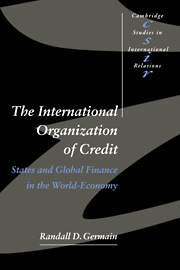Book contents
- Frontmatter
- Contents
- List of figures and tables
- Preface
- Note on figures and tables
- Glossary
- 1 Routes to international political economy: accounting for international monetary order
- Part 1 The international organization of credit in historical perspective
- Part 2 The contemporary international organization of credit
- Appendix: Top merchant/investment banks, by city and era
- References
- Index
- CAMBRIDGE STUDIES IN INTERNATIONAL RELATIONS
1 - Routes to international political economy: accounting for international monetary order
Published online by Cambridge University Press: 14 January 2010
- Frontmatter
- Contents
- List of figures and tables
- Preface
- Note on figures and tables
- Glossary
- 1 Routes to international political economy: accounting for international monetary order
- Part 1 The international organization of credit in historical perspective
- Part 2 The contemporary international organization of credit
- Appendix: Top merchant/investment banks, by city and era
- References
- Index
- CAMBRIDGE STUDIES IN INTERNATIONAL RELATIONS
Summary
Towards an interdisciplinary international political economy
The renaissance of international political economy (IPE) scholarship on the international monetary system (IMS) is now twenty years old. It crystallized in 1977 with the publication of Benjamin Cohen's Organizing the World's Money and Fred Block's The Origins of International Economic Disorder, both of which reflected a growing belief among a small band of scholars that the disciplines of economics and politics could no longer credibly uphold their claims to being the monopolistic heirs of knowledge on monetary issues. As IPE coalesced as a field of inquiry in the late 1970s and early 1980s, other studies picked up and extended the themes that have come to mark the core of its analysis of the IMS. With the publication over the last ten years of work as diverse as Susan Strange's Casino Capitalism and Ethan Kapstein's Governing the Global Economy, IPE must now be considered one of the central avenues of inquiry through which the organization of the IMS is explored. This renaissance has been driven in part by the way in which IPE both cuts across disciplinary boundaries and seeks to understand the totality of its subject matter, free from the intellectual chains of a single, entrenched discipline. More by accident than design, IPE has begun to emerge as a discipline in its own right.
Despite the claims of many IPE scholars, however, two significant hurdles stand in the way of developing IPE as a more self-conscious or reflexive field of social inquiry. The first hurdle is the imperial pretensions which both politics and economics harbor towards their erstwhile progeny.
- Type
- Chapter
- Information
- The International Organization of CreditStates and Global Finance in the World-Economy, pp. 1 - 30Publisher: Cambridge University PressPrint publication year: 1997

